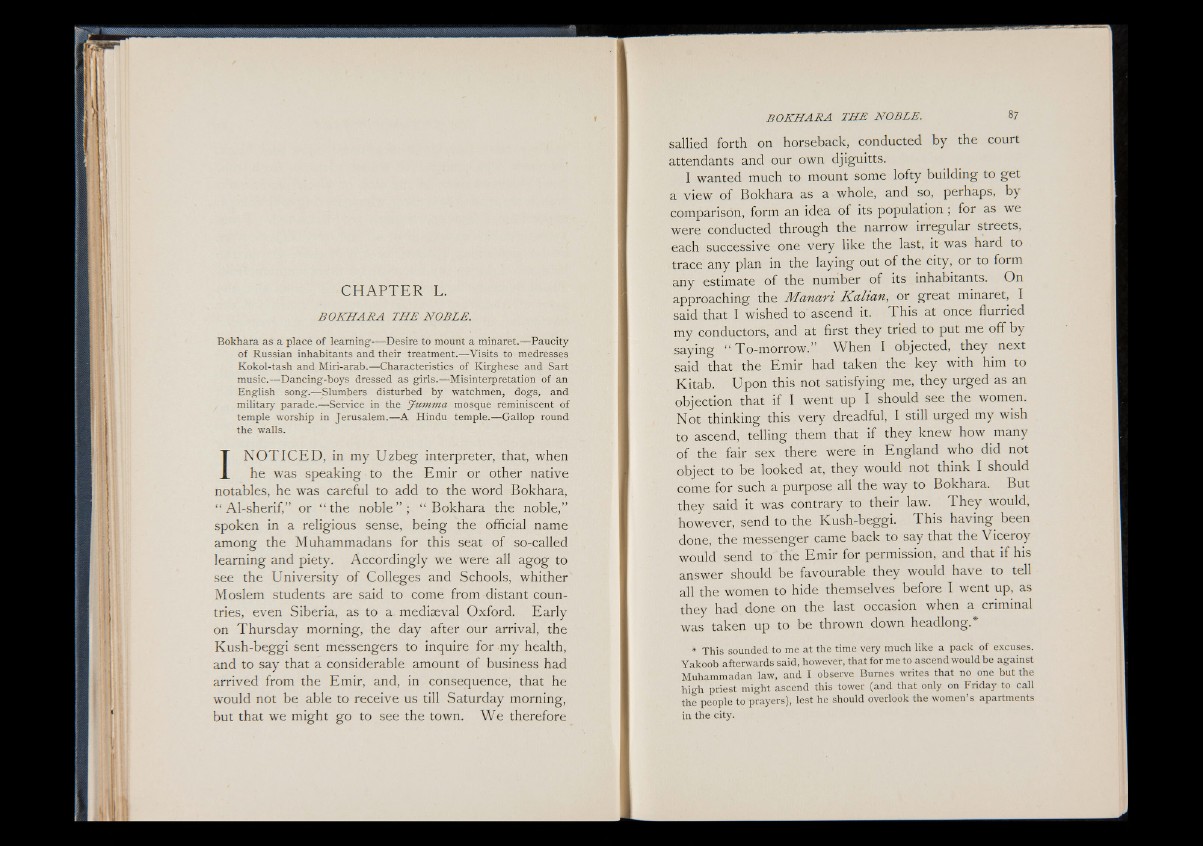
C H A P T E R L.
B O KH A R A THE NOBLE.
Bokhara as a place of learning— Desire to mount a minaret.— Paucity
of Russian inhabitants and their treatment.—Visits to medresses
Kokol-tash and Miri-arab.— Characteristics of Kirghese and Sart
music.—Dancing-boys dressed as girls.—Misinterpretation of an
English song.— Slumbers disturbed by watchmen, dogs, and
military paradeS-Service in the Jumma mosque reminiscent of
temple worship in Jerusalem.—A Hindu temple.— Gallop round
the walls.
I N O T IC E D , in my Uzbeg interpreter, that, when
he was speaking to the Emir or other native
notables, he was careful to add to the word Bokhara,
“ Al-sherif,” or “ the noble” ; “ Bokhara the noble,”
spoken in a religious sense, being the official name
among the Muhammadans for this seat of so-called
learning and piety. Accordingly we were all agog to
see the University of Colleges and Schools, whither
Moslem students are said to come from distant countries,
even Siberia, as to a mediaeval Oxford. Early
on Thursday morning, the day after our arrival, the
Kush-beggi sent messengers to inquire for my health,
and to say that a considerable amount o f business had
arrived from the Emir, and, in consequence, that he
would not be able to receive us till Saturday morning,
but that we might go to see the town. W e therefore
sallied forth on horseback, conducted by the court
attendants and our own djiguitts.
I wanted much to mount some lofty building to get
a view of Bokhara as a whole, and so, perhaps, by
comparison, form an idea of its population ; for as we
were conducted through the narrow irregular streets,
each successive one very like the last, it was hard to
trace any plan in the laying out of the city, or to form
any estimate of the number of its inhabitants. On
approaching the M anari Kalian, or great minaret, I
said that I wished to ascend it. This at once flurried
my conductors, and at first they tried to put me off by
saying “ To-morrow.” When I objected, they next
said that the Emir had taken the key with him to
Kitab. Upon this not satisfying me, they urged as an
objection that if I went up I should see the women.
Not thinking this very dreadful, I still urged my wish
to ascend, telling them that if they knew how many
of the fair sex there were in England who did not
object to be looked at, they would not think I should
come for such a purpose all the way to Bokhara. But
they said it was contrary to their law. T h e y would,
however, send to the Kush-beggi. This having been
done, the messenger came back to say that the Viceroy
would send to the Emir for permission, and that if his
answer should be favourable they would have to tell
all the women to hide themselves before I went up, as
they had. done on the last occasion when a criminal
was taken up to be thrown down headlong.*
* This sounded to me at the time very much like a pack of excuses.
Yakoob afterwards said, however, that for me to ascend would be against
Muhammadan law, and I observe Burnes writes that no one but the
high priest might ascend this tower (and that only on Friday to call
the people to prayers), lest he should overlook the women’ s apartments
in the city.